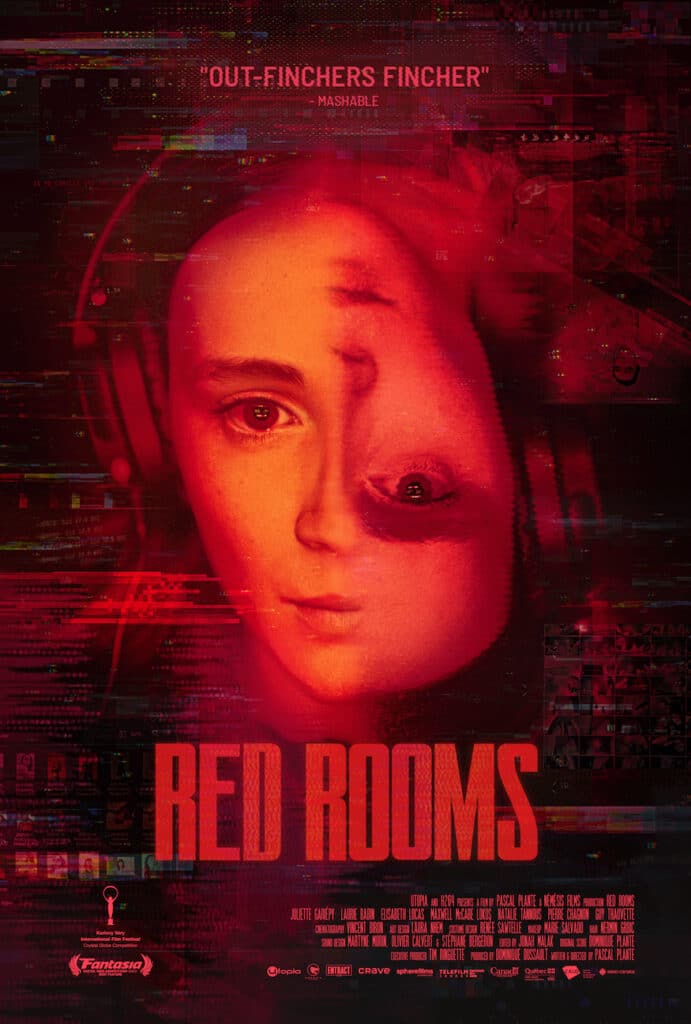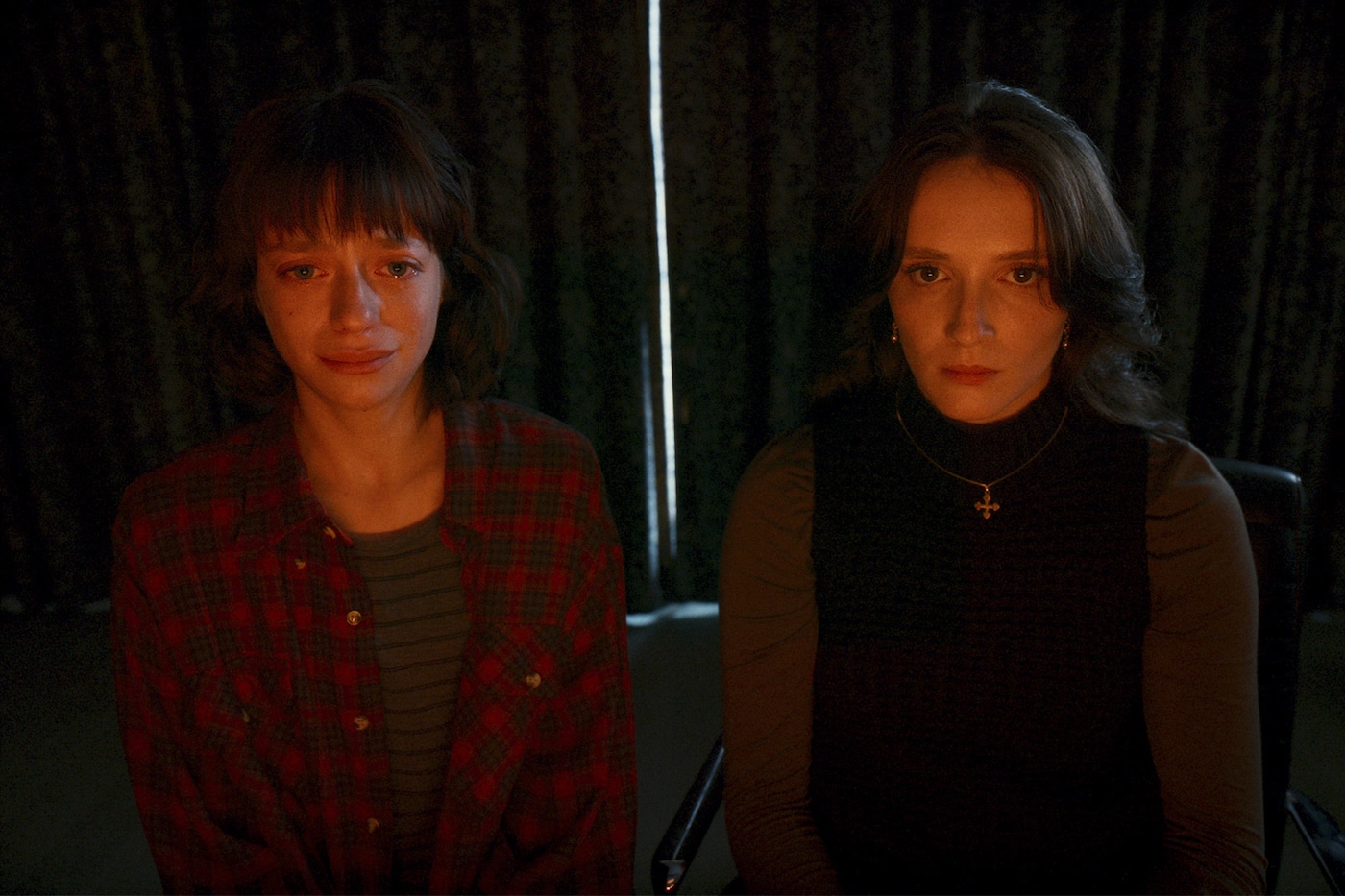Starring Juliette Gariépy, Laurie Babin, and Elisabeth Locas
Written and Directed by Pascal Plante
Distributor: Utopia
If you’re planning to watch a chilling film with “room” in the title this weekend, make sure to catch the limited release of RED ROOMS (LES CHAMBRES ROUGES). While primarily a dramatic thriller, it delves into some truly horrific aspects of the human psyche. This Quebecois, French-language film was a standout at last year’s Fantasia festival, earning multiple top awards and firmly establishing itself among this year’s best genre films. Kudos to distributor Utopia for bringing this and the equally remarkable British film FEMME, which also received major accolades at Fantasia ’23, to U.S. theaters.
RED ROOMS offers a deeply unsettling experience, serving as both a compelling character study and a reflection on the cult-like fascination with serial killers. The focus is on Ludovic Chevalier (Maxwell McCabe-Lokos), who is accused at the film’s outset of gruesomely murdering three teenage girls while live-streaming the acts in a “red room” on the dark web. One can’t help but wonder if his surname is a playful nod to Maurice Chevalier, who famously sang “Thank Heaven for Little Girls.” Known as the “Demon of Rosemont,” Chevalier is at the center of a trial that has captured the attention of Montreal, particularly that of fashion model Kelly-Anne (Juliette Gariépy).
In an attention-grabbing lengthy opening sequence, writer/director Pascal Plante takes us into the courtroom on the first day of Chevalier’s trial, where the prosecution lays out its case alongside the defense’s argument. Cinematographer Vincent Biron’s slow-moving camera meticulously captures key figures in a single, uninterrupted shot. By the end of this sequence, you find yourself as captivated by the case as Kelly-Anne is.

You quickly find yourself drawn to Kelly-Anne, who views the trial as more than just a diversion from her lonely existence. She resides in an expensive yet sterile apartment high above the city, where the wind howls mournfully outside. Her double-monitor computer setup not only serves her online poker habits, which supplement her income, but also fuels her obsession with Chevalier. Before long, she begins to dig into the details of one of the victim’s family. What is her true intent? Writer-director Pascal Plante cleverly keeps this under wraps for a considerable time, teasing her motivations and ultimate goals while avoiding simplistic explanations for her fixation on Chevalier’s twisted deeds. Juliette Gariépy skillfully portrays Kelly-Anne with a cool demeanor, subtly suggesting deeper, darker impulses. Together, she and Plante have crafted a complex psychological enigma that captivates your attention.
Kelly-Anne even resorts to sleeping on the sidewalk near the courthouse to secure a spot in the gallery, where she encounters Clementine (Laurie Babin), a teenager who shares her intense interest in Chevalier. Unlike Kelly-Anne’s ambiguous fascination, Clementine is a full-fledged groupie who firmly believes in his innocence, seizing every chance to voice her opinion, including a memorable call to a sensational TV talk show. After traveling a long distance from home, Clementine is invited to stay with Kelly-Anne, leading to a budding friendship rooted in their shared obsession. While Clementine’s youthful idealism and naïveté are convincingly portrayed by Babin, it remains challenging to predict the trajectory of their relationship, adding an extra layer of intrigue.
One certainty is that Plante delves into ever-darker realms of human emotion and behavior, particularly as Kelly-Anne becomes increasingly consumed by the murders and the individuals involved. Although there are moments of levity—like Kelly-Anne’s Siri-like AI assistant, who tells dad jokes reminiscent of Andy in ALIEN: ROMULUS—RED ROOMS is primarily an exploration of escalating dread. Plante achieves this not through graphic depictions of the crimes but by tapping into our pervasive fascination with true crime, revealing it to be nearly as unsettling as the acts themselves. Together with cinematographer Vincent Biron, he employs a 3:2 aspect ratio that visually constricts the two leads, mirroring Kelly-Anne’s growing confinement and isolation due to her obsession with Chevalier.
As RED ROOMS nears its conclusion, Kelly-Anne’s actions take a deeply troubling turn, suggesting she has crossed a critical threshold. Yet, Plante continues to surprise us with new layers and revelations while maintaining a chilling atmosphere. In a film landscape saturated with serial-killer stories, he presents a fresh perspective on the subject that truly unnerves us.

